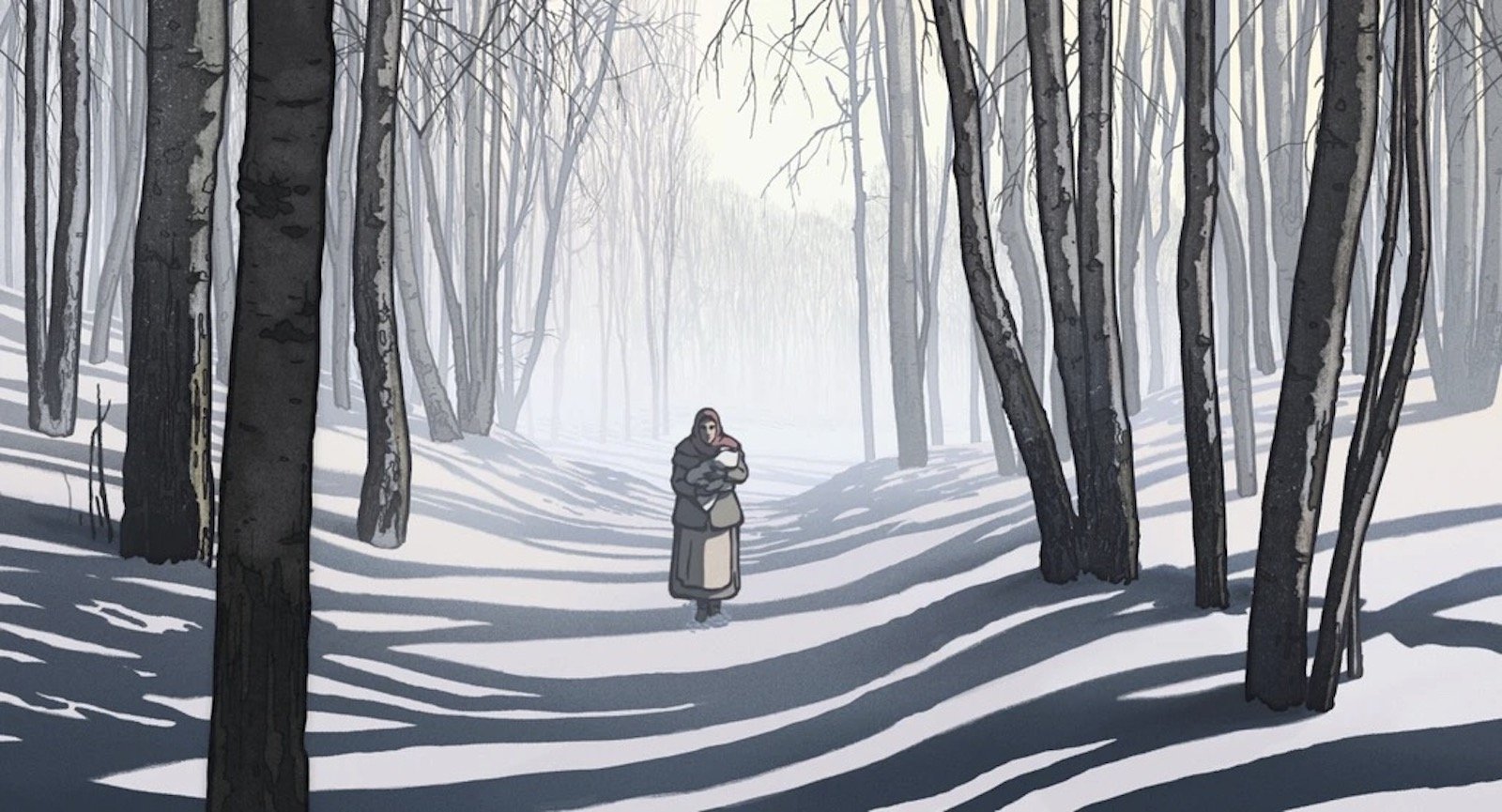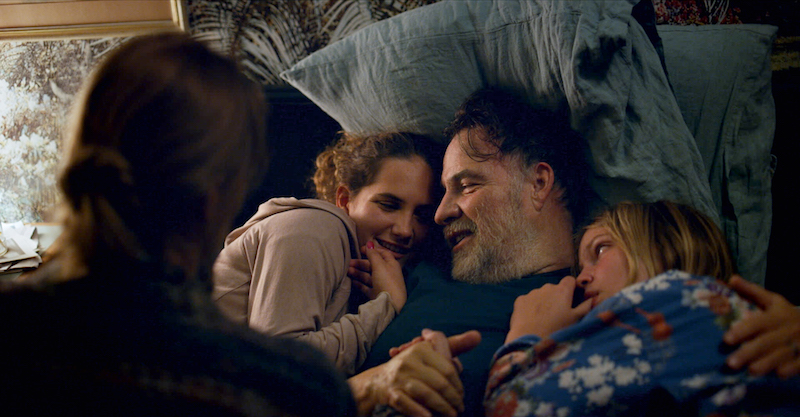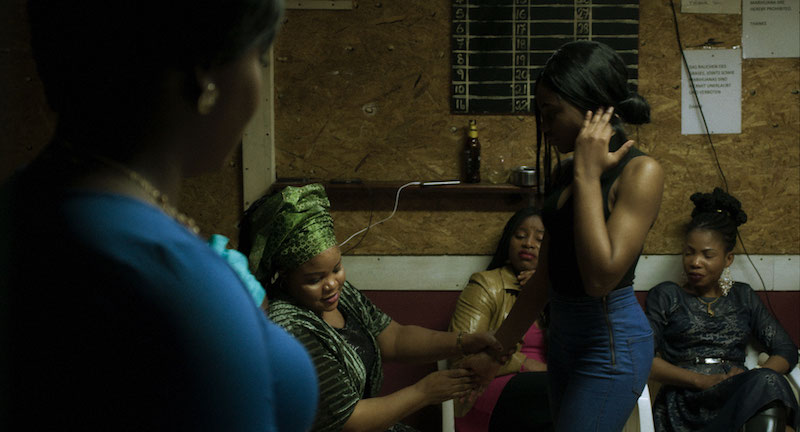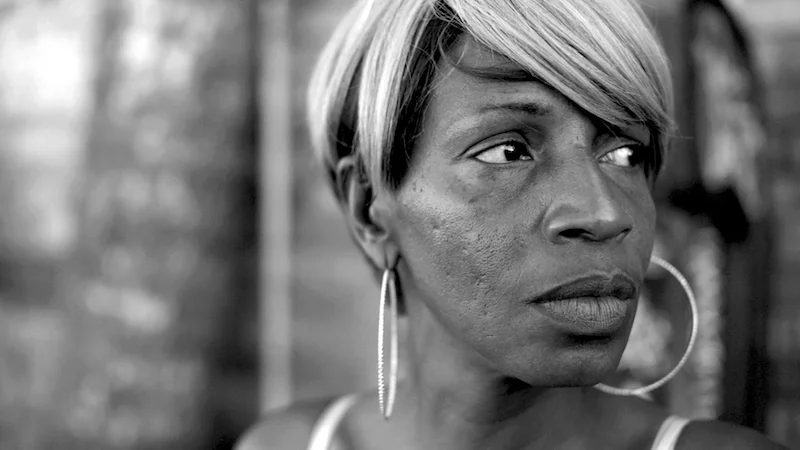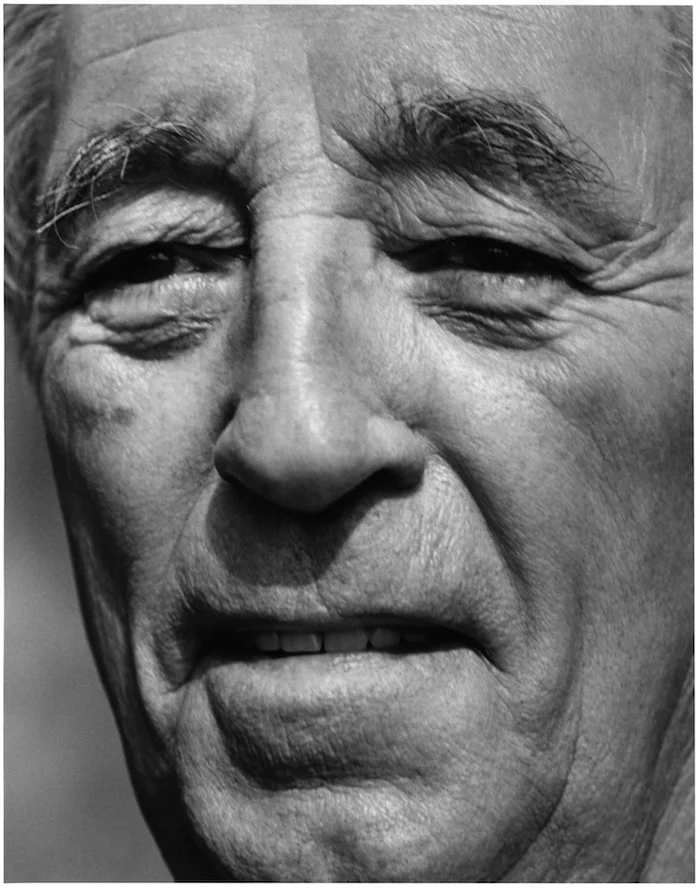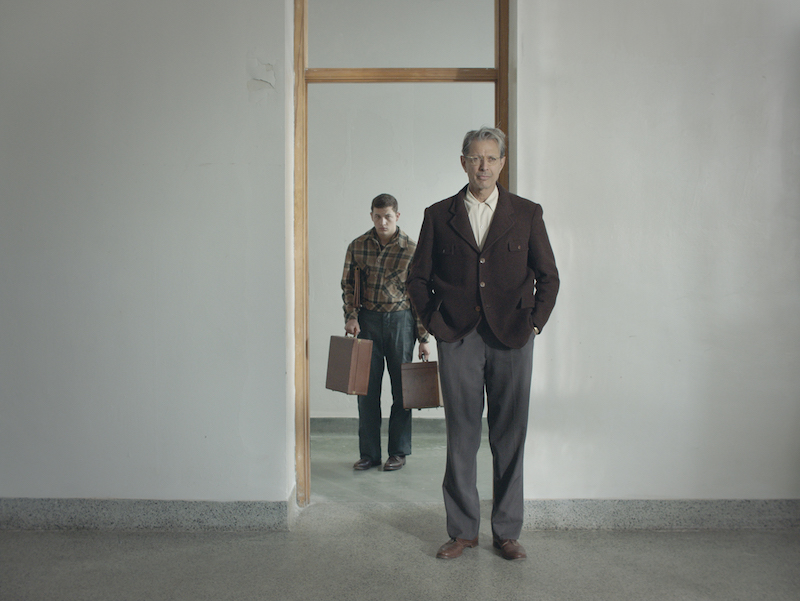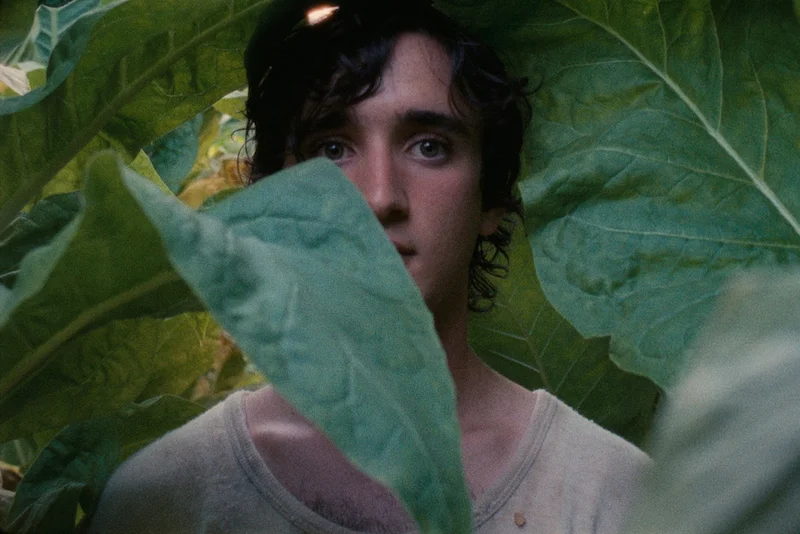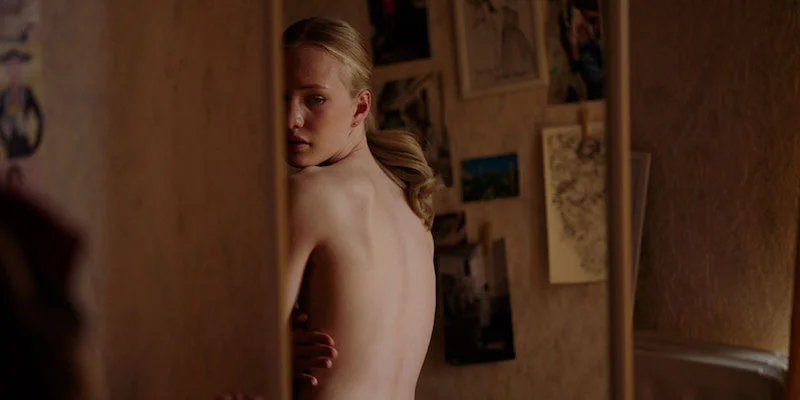‘The Most Precious of Cargoes’ is the French-born director’s foray into animation and features the narration of legendary actor Jean-Louis Trintignant in what would turn out to be his last role.
Read MorePalestinian story 'Happy Holidays' wins Etoile d'Or in Marrakech
Plus Polish director Damian Kocur won the Best Directing Prize for his Ukrainian story ‘Under the Volcano’.
Read MoreA still from ‘The land was well past its zenith’ by Rita Mahfouz
"We have to set our minds on how to create pockets of hope": Elia Suleiman on holding DFI's Qumra in these challenging times
Plus actress and producer Toni Colette, is confirmed as the sixth 2024 Master for the upcoming tenth anniversary edition of the industry incubator and the participating projects are announced.
Read MoreA still from Hamida Issa’s ‘Places of the Soul’
The Qumra Diaries: Souq Waqif, "from desert to desert", Alice Rohrwacher and Kiyoshi Kurosawa
On my last day in Doha, I spend the afternoon wandering around the Souq Waqif which I learned from a local filmmaker, literally translates as “the stand up souk.” In the olden days, before Qatar turned into the international, cosmopolitan country it is today, the sea would come straight into the alleys of the souk so the merchants had to stand up and pick up their wares during the tides. Thus the name, and actually while I wandered around checking out the shops, having a shawl sewn from a traditional flower fabric by a local tailor while drinking a karak chai (cardamon infused milky tea) and eating a chapatti flat bread filled with zaatar, I felt like I was transported back to those early days of the pearl divers and their haunting songs of the sea.
Doha is special place. I’ll never get tired of saying it. And their annual Qumra event, organized by the Doha Film Institute is sheer cinematic magic. Qumra is a meeting place, a five-days long networking session, a place to pitch, secure financing and ensure a screening chance for film projects. But it is also an occasion to recharge our collective passion for the movies. For journalists, producers and of course filmmakers, the atmosphere at Qumra offers an almost electric energy, a jolt of renewed hope in the future of the 7th art.
Read MoreEugenio Caballero talks with Richard Peña during Qumra
The Qumra Diaries: Eugenio Caballero and Pawel Pawlikowski share their filmmaking wisdom
When I look at the title of this piece, I feel overwhelmed myself. I mean, it would be pretty wonderful to just hear one of the these two men who are such Maestros in each of their professions give a Masterclass. But when you get them both, within 24 hours of each other, on a stage, talking to the equally wondrous Richard Peña, well, you have cinematic magic.
Or more precisely, what you have is the Doha Film Institute’s annual Qumra event.
Read MoreHanaa Issa with filmmaker Elia Suleiman at a DFI event
"This is the environment where films flourish": Talking Qumra 2019 with Hanaa Issa in Berlin
Ever since its creation in 2010 on the peninsular country of Qatar, the Doha Film Institute has been revolutionizing cinema in the Region. The word “revolution” is never a sign of good things in the Arab world and yet at DFI, they should welcome the term when it comes to describing the work they’ve been doing almost singlehandedly to create and foster a healthy cinema culture in the Arab world. And beyond.
Read MoreNebbia — Filippo Sorcinelli
City of Fragrances, Part Two: Scents, Art and Sensibility
Sight and sound are definitely a part of our earliest memories. They say children can remember only from the age of three and a half upward and I have to say, my first memory has to do with sticking my finger in the electric socket and feeling the jolt. I remember feeling like someone had pushed me and apparently — this is my parents’ memory of the event — I ran to the living room crying holding my index finger, utterly frightened.
But how much does scent, the smells around us, have to do with our individual memory bank? Personally, I can’t help but remember my favorite uncle Pippo every time I smell a certain brand of cigarette smoking up the air. And I go back to my childhood quickly, as soon as I step off the train in Florence and smell the city’s distinctive scent of, well how do I put it nicely, sewer… Just recently I was told why that smell is so intrinsically Florentine and it has to do with the lack of a sewage system dating back to Medici time. Apparently, every time the system fills up, giant trucks come to gather up the goodies and carry them away. There are serious studies done on it!
So it’s no surprise that the Florentines were some of the first people to use scents, ambiance fragrances and perfume to change the air around them.
Read MoreFrescoes by Mariotto di Nardo, inside the Santa Maria Novella shop in Florence
City of Fragrances, Part One: Florence at the scent-er of this year's Pitti Fragranze
This year, the iconic once-a-year fragrance fair Pitti Fragranze, which is held in Florence every September, incorporated the entire city into its scent design. Thus, in the process, let the select audience of buyers and journalists that attended the event, in on the secret nooks and crannies of the great renaissance town. From the Officina Profumo Farmaceutica di Santa Maria Novella, to the church of San Miniato al Monte, from the center to the outskirts, Florence became the “City of Fragrances” and in the process, reclaimed its scent, health and beauty heritage.
Following are a few personal highlights from this incredible journey of scent.
Read MoreA still from ‘The Man Who Surprised Everyone’ by Natalya Merkulova and Alexey Chupov
The Venice Diaries: 'The Man Who Surprised Everyone' is the antidote to intolerance
How would you cope with being told you have a terminal illness?
That is a question I’ve asked myself often these days, as I deal with people I love getting ill and the recent death of my father. Where do you find the strength to go on, when you know the days are numbered and how do you continue to be a functioning member of society when probably all you wish to do is go into the woods and hide?
Well, in Natalya Merkulova’s and Alexey Chupov’s haunting, beautiful and at times painfully truthful film ‘The Man Who Surprised Everyone’ which screened in the Orizzonti section in Venice, the real life husband and wife team tackle the difficult question.
Read MoreSawsan Arsheed in a still from Soudade Kaadan's 'The Day I Lost My Shadow'
The Venice Diaries: Lion of the Future winner Soudade Kaadan's 'The Day I Lost My Shadow'
'The Day I Lost My Shadow' by Soudade Kaadan won the Lion of the Future – “Luigi De Laurentiis” Venice Award for a Debut Film Jury at the 75th Venice Film Festival. It's a win to be celebrated for all women filmmakers, of course, but also for Syrian filmmakers who, since the start of the war in 2011 have all but disappeared. Scattered around foreign lands, their voices and visions have become the true casualties of this conflict.
In her film, which world premiered at the festival in the Orizzonti section, Kaadan uses the metaphor of personal shadows as a way to show how the war strips people of their humanity and hope. When Sana, played by the beautiful Sawsan Arsheed, goes out looking for a gas canister so she can cook for her son, she is pulled into a three day nightmare that eventually ends the way everything ends in Syria... I'll leave that to your imagination and perhaps your first viewing of the film.
Read MoreBouli Lanners, flanked by Justine Lacroix, right and Sarah Henochsberg in Claire Burger's 'C'est ça l'amour'
The Venice Diaries: Giornate degli Autori winner Claire Burger on her film 'C’est ça l’amour' (Real Love)
Think back to the last time a film redefined love for you. That felt like a magical discovery then, didn't it? For me, cinema exists at its best when it does something that changes me -- and of course I want that change to be for the better.
In Claire Burger's touching follow up to her Cannes Camera d'Or winner 'Party Girl' -- which she co-directed with Marie Amachoukeli and Samuel Theis -- I found a new fatherhood role model. For a woman whose own father was at best unavailable throughout my teenage years and beyond, Burger's wondrous father figure Mario (played by the spellbinding Bouli Lanners) is a revelation and offers a sense of newfound hope. His quest to be a good father to the young Frida (the perfectly rebellious Justine Lacroix) and the teenage Kiki (cool and flirty Sarah Henochsberg) takes the audience on a journey of discovery along with the characters.
But 'C'est ça l'amour' is a multilayered film and so it's no surprise that, among quite a few strong and beautiful stories featured in this year's Giornate degli Autori line up, Burger's film ended up walking away with the top prize -- the GdA Director's Award.
Read MoreThe Venice Diaries: Sudabeh Mortezai's 'Joy' wins multiple awards, and conquers hearts, in Venice
As we watch our nightly dose of immigration porn fed to us by the local news channels, particularly those of us who live in Europe we see row after row of young men stepping off boats and assorted vessels. We could be mistaken into thinking that they left their women safe at home, in their country of origin, the wives and girlfriends and mothers awaiting their return, as well as their paycheck. That's so far from the truth and if you ever held such a wrong opinion, 'Joy' by Sudabeh Mortezai will set you straight.
In her beautifully shot and perfectly told film premiering in the Giornate degli Autori, Venice Days sidebar at the Venice Film Festival, Mortezai shows us the complex network of Nigerian women who virtually invisibly inhabit our European streets. 'Joy' is as much about the oldest profession in the world, the prostitution networks these women get sucked into and then, once they have paid off their debts, also manage and run in Europe, as it is about womanhood itself. We follow the story of these young women from the juju ritual they are subjected to at home, in Benin City Nigeria, to the streets of Vienna where they owe their traffickers the kind of money one wouldn't spend traveling around the world for a year and staying at the best hotels.
Read MoreVincent Lacoste and Isaure Multrier in 'Amanda' by Mikhaël Hers
The Venice Diaries: Stacy Martin and Vincent Lacoste redefine family in Mikhaël Hers' 'Amanda'
I'm a sucker for a great love story. But often, the films that hit me deepest aren't filled with happily ever after endings and the perfect romance between a handsome boy and a beautiful girl. It's the redefinition of true love that gets me to my core.
In Mikhaël Hers' latest 'Amanda' which premiered in the Orizzonti section at this year's Venice Film Festival, the filmmaker reworks the idea of family and in the process, also rewrites the perfect romance. Of course Hers' film is not missing out on a handsome boy -- the charming Vincent Lacoste breaks hearts as David -- and a pretty girl -- with the striking Stacy Martin playing his love interest Léna. But at the center of 'Amanda' is the title character, a little girl played beautifully by Isaure Multrier, a child who suddenly goes from being an occasional playmate in the life of her somewhat immature uncle David, to being entrusted to him permanently.
Read MoreJudy in a still from Roberto Minervini's 'What You Gonna Do When the World's On Fire?'
The Venice Diaries: Roberto Minervini's 'What You Gonna Do When the World's On Fire?'
Of all the films we watched at this year's Venice Film Festival Roberto Minervini's was the most important.
For two very specific reasons. One, it's a documentary, and while many narrative films did explain my own personal struggle as a modern woman in today's world, those fictional stories can be dismissed by their critics as simply made up. 'What You Gonna Do When the World's On Fire?' cannot, since it's real life, it's in your face and it's downright true.
Point number two follows closely my first point, in that while watching the press preview of Minervini's film, which premiered in Competition at the festival, I saw more of my colleagues shift in their seat and -- after what appeared like much inner debate and a prolonged anxiety -- leave the theater than ever before. The answer is not a reflection on the quality of 'What You Gonna Do...' which is visually stunning, features a terrific soundtrack and makes its two hours duration fly by in what seemed like fifteen minutes.
Read MoreRobert Mitchum photographed by Bruce Weber
The Venice Diaries: Bruce Weber paints a daring portrait of Robert Mitchum in 'Nice Girls Don't Stay for Breakfast'
As I sat down to meet legendary fashion photographer Bruce Weber I said "Mr. Weber, I can't say I grew up with your photographs because I'm older than I look, but I definitely grew into my sexuality thanks to your iconic images." It's true. Those NYC billboards in Times Square of underwear models for Calvin Klein, the Ralph Lauren "out of Africa" campaign, Kate Moss in the bathtub, the beach scenes, the catalogues I devoured before the advent of the internet, I grew into my skin thanks to Weber's images.
Today, Weber has helped me to rediscover the beauty and genius of classic American actor Robert Mitchum. 'Nice Girls Don't Stay for Breakfast' screens at the Venice Film Festival in the Venice Classics section and is co-produced by Weber's wife Nan Bush. In the documentary, Mitchum is shown as never before, a singer, a lover and a poet, aided in part by cameos by Johnny Depp, Benicio Del Toro, Polly Bergen, Brenda Vaccaro and Liam Neeson, among many many more.
So why a film about Mitchum, why from Weber and why now?
Read MoreTye Sheridan and Jeff Goldblum in a still from Rick Alverson's 'The Mountain'
The Venice Diaries: Rick Alverson's 'The Mountain' shows us the perils of an American "antiseptic utopia"
Filmmaker Rick Alverson has never made films that are easily comprehensible to an audience. His work is the antithesis to the American superhero movie. From his first work 'The Builder' in 2010 he's proudly yet quietly worn the "independent filmmaker" badge of American moviemakers. In the tradition of greats like Dennis Hopper and John Cassavetes who came before him.
In his latest film 'The Mountain' which premiered in Competition at this year's Venice Film Festival, Alverson throws the audience a proverbial bone. What I mean is that 'The Mountain', starring Jeff Goldblum and Tye Sheridan, is as close to a traditional film as we will ever get from Alverson. While he still describes it as "an anti-utopian film" in his director's statement, 'The Mountain' takes the audience through a hippie trippy ride on a sparse, pastel hued rollercoaster with few words, great acting, haunting images and sounds and by the end, leaves us feeling lobotomizes. I could swear the entire crowd of the Sala Darsena, where the press and industry screening took place the day before the film's official premiere, walked out with a very specific look on their faces. Not unlike that of the leading character of Andy, played by Sheridan.
Read MoreThe Cannes Diaries 2018: 'Lucia's Grace' ('Troppa Grazia') is a miracle of a film!
One of the freshest and most romantic films I watched in Cannes was Gianni Zanasi’s ‘Lucia’s Grace’ which screened in the Directors’ Fortnight section. On Thursday night it was awarded the Label Europa Cinema prize and personally, I was elated. Zanasi’s film is another one of those modern Italian cinematic gems that have brought me home. Quite literally.
I moved back to my birth country five years ago because its newest wave of movies and filmmakers made me once again proud of being Italian. And Zanasi’s film also features as Lucia one of the most exciting young actresses in indie cinema today, Alba Rohrwacher, whom we can definitely claim as Italian but who is so much bigger and better than that label alone. Her wit, the way she can take the most basic of characters and build around them grand nuances and subtle mannerisms make her so cool that she may as well read the phone book on the big screen. And I’ll pay to watch that.
Read MoreDylan Roberts and Kenza Fortas in Jean-Bernard Marlin's 'Sheherazade'
The Cannes Diaries 2018: Jean-Bernard Marlin's 'Shéhérazade' is a "luminous love story"
From the black and white stock image reels that kick off the titles of Jean-Bernard Marlin's 'Shéhérazade', the viewer knows they'll be experiencing something different. Even though the film could at first glance appear to be yet another Romeo and Juliet type romance between star crossed lovers, it quickly unfolds into something much more unique and spellbindingly truthful.
Seventeen year old Zach (played by Dylan Roberts) comes out of jail in his native Marseille, only to find that his mother isn't picking him up, she seems to have forsaken him. He is thus taken to a group home and quickly escapes only to try and reconnect with the life that sent him to prison in the first place. But one day, his friends take him to find a prostitute, and there he meets a girl, Shéhérazade (played by Kenza Fortas) whom he remembers from school. Their encounter isn't romance perfect at first, though their "meet cute", the moment in which their stars cross in cinematic terms is perfect. And perfectly human.
Will they make it despite the entire world seemingly being against them?
Read MoreAdriano Tardiolo in a still from Alice Rohrwacher's 'Happy as Lazzaro'
The Cannes Diaries 2018: The inimitable Adriano Tardiolo in Alice Rohrwacher's 'Happy as Lazzaro'
In the midst of the screening of Alice Rohrwacher's latest 'Happy as Lazzaro' ('Lazzaro Felice') I was overcome by a nearly unbearable sense of pride at being Italian. It's something I've come across one or two times before and I believe it is due to this new wave of fellow compatriot filmmakers who have brought back the idea of magic to Italian cinema.
As I sobbed in my seat, I realized that all the inspiration that lacked in our movies from about the late Seventies to now, has surged powerfully into a movement that has infiltrating the old status quo and created a brand new tsunami of talent in the process. And that simply takes my breath away.
When I sat with Rohrwacher a day later, she admitted that while in the past there existed a competition between Italian filmmakers as to who would be named the best one, now there is a stronger sense of community among the younger talents and that has made for better cinema.
Read MoreVictor Polster in a still from Lukas Dhont's 'Girl'
The Cannes Diaries 2018: Lukas Dhont brings to Cannes his perfect 'Girl'
At the center of filmmaker Lukas Dhont's groundbreaking first feature 'Girl' -- screening at this year's Festival de Cannes in Un Certain Regard -- is a teenager who wants to be a ballerina. Complex, as all teenagers typically are, beautiful, painfully honest and exquisitely feminine, the only twist here is that Lara was born a boy. And it's obvious from her very first moments on the screen that having that part of the body which separates the boys from the girls is something utterly unbearable for Lara.
But instead of creating conflict around this beauty, be it coming from her family, friends and the world at large, Dhont brings us instead into a world where a girl born into a boy's body who begins treatment to transition to her true self when we first meet her, has all the support she could ever hope for. And yet, her own passions, her self discipline, her sense of displacement inside the body fate dealt her at birth create enough strife, hold-your-breath moments and emotions to fully charge a one hour and forty-five minutes film. And fill our dreams for days and days to come.
Read More